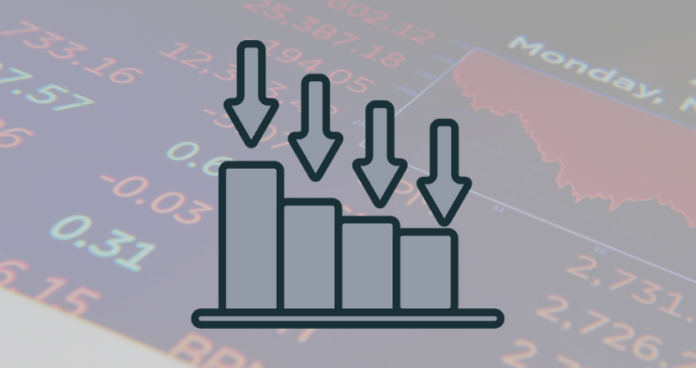Bears took control of the trading floor at the Pakistan Stock Exchange (PSX) as the benchmark KSE-100 lost over 1,100 points during the intraday trading on Monday.
Market experts attributed the decline to investor fears of a recession in the US economy. They said that local investors were staying on the sidelines until global market conditions stabilised.
Analysts said the market’s reaction is due to a global sell-off triggered by fears of a slowdown in the US economy and a potential rate hike by the Bank of Japan.
As per the PSX website, the KSE-100 Index fell 1172.41 points to 77,053.57 mark at 02:46 pm, down by 1.5%.
Key sectors, including automobile assemblers, cement, chemical, commercial banks, oil marketing companies (OMCs), and refineries, saw widespread selling. Major stocks like PSO, SHEL, HBL, MCB, MEBL, and NBP traded in the red.
At the day’s close, the benchmark index settled at 77,084.48 level, with a decline of 1141.50 points or 1.46% from the previous close of 78,225.98 points.
Last week, the PSX remained highly volatile due to concerns over political instability in the country. The KSE-100 index, after fluctuating throughout the week, closed slightly higher at 78,225.98 points, gaining 196.47 points on a week-on-week basis.
During the week, Fitch raised Pakistan’s long-term foreign currency issuer default rating (IDR) to ‘CCC+’ from ‘CCC’, while S&P maintained Pakistan’s rating at ‘CCC+’ for long-term sovereign credit rating and ‘C’ for short-term rating.
Reuters reported the US stock index futures tumbled on Monday, with those tied to the Nasdaq falling nearly 4%, as fears of the United States slipping into a recession rippled through global markets.
Stock markets from Asia to Europe also took a beating and bond yields slid as investors rushed to safe-haven assets and investors bet the US Federal Reserve would need to cut interest rates quickly to spur growth.
A report released on Friday showed the US economy added only 114,000 jobs last month, significantly fewer than expected, and the jobless rate rose to its highest level since October 2021. This came a day after disappointing factory data, raising concerns that the Fed may have kept borrowing costs at over two-decade highs for too long, potentially leading to a hard landing and recession.
A weak jobs report and shrinking manufacturing activity in the world’s largest economy, coupled with dismal forecasts from the big technology firms, pushed the Nasdaq 100 and Nasdaq Composite into a correction last week.
Japanese stocks collapsed on Monday in their biggest single-day rout since the 1987 Black Monday sell-offs, driven by last week’s plunge in global stock markets, economic concerns and worries investments funded by a cheap yen were being unwound.
The Nikkei share average shed a staggering 12.4% as Friday’s dismal jobs data heightened worries of a possible recession, and as the yen rallied to 7-month highs versus the dollar. This was the index’s worst showing in percentage terms since the October 1987 crash.
South Korea’s stock market marked its worst session since the global financial crisis of 2008 on Monday, with trading curbs activated for the first time in four years, as tech stocks slumped amid US recession fears.




